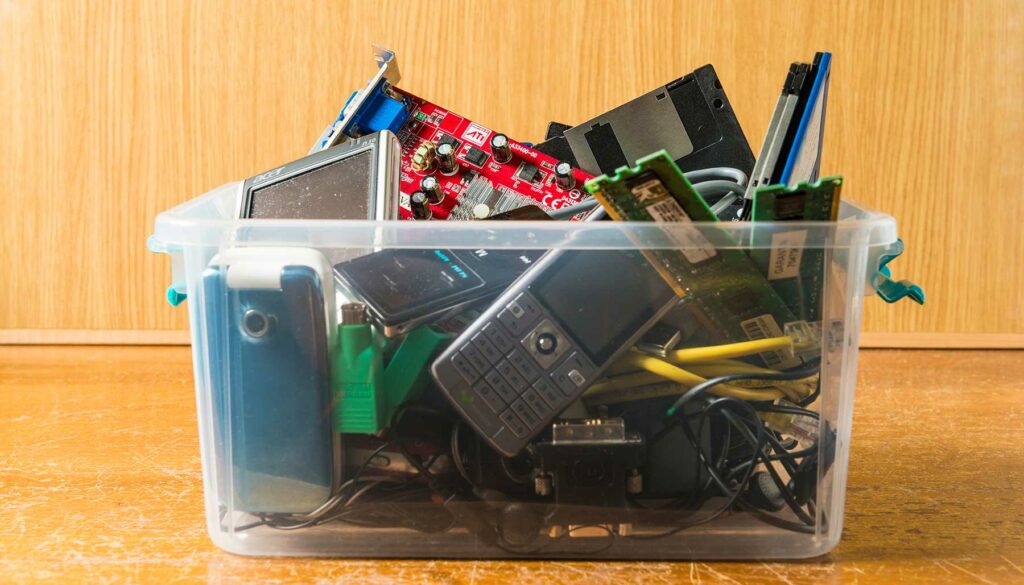I will be the first to admit that I like stuff. There are plenty of items that I hold on to for sentimental reasons. You could say I have a history of it, considering I still have odd items from 30 or so years ago. Hey, that New Kids on the Block beach towel wasn’t all that coveted for a really long time, but it has certainly regained its coolness in recent years!

I also tend to keep things that are useful, even if I am not actually using them. Why throw out a perfectly good ice cream maker? Sure, I haven’t used it in at least five years, but what if I suddenly need it one day? This also applies to my craft supplies and fabric stash. I should keep it around because I might need it one day, right?
While these are obviously good reasons to keep things, it eventually gets out of hand. As you can see, I struggle with decluttering.
Related: Essential Cleaning Products Every Home Should Have
If you also struggle to declutter, you have to figure out why you’re having such a hard time. It could be one of the reasons I have, but there are plenty of other reasons why people have difficulty decluttering their stuff. Figuring out that reasoning is the first thing you need to do to get a grip on your stuff situation! This way, you can get to the root of why you’re struggling. It will help you overcome the obstacles that are holding you back from decluttering your space.
The Benefits of Decluttering Your Space

First, let’s talk about why we need to declutter. Shedding the extra stuff is completely worth the effort and time required.
The extra time needed to get rid of things will actually save you time in the long run. First and foremost, you won’t spend as much time looking for stuff. Once you’ve cleared the clutter, it will be much easier to keep track of what you own and where it is located, instead of rummaging around to find things. You will also spend much less time cleaning, because it’s much easier to keep a place tidy when there’s less stuff in it. This means more time to do the things you enjoy!
Ditching all the extra junk will also help you save a little money. I can’t tell you how many times I’ve re-bought something because I either couldn’t find it or because I forgot I had it to begin with. Decluttering can also help you save money when you’re at the store, though – by making you more aware of what you are purchasing, and making more mindful choices.
Related: Tips For Cleaning Out Your Closet
Decluttering can also give you more peace of mind. Having a home that feels out of control and cluttered can make just about anyone feel stressed. Even if you don’t consciously notice it, all the mess is taking a toll on your mental health. It takes up space in your mind, just like it takes up space in your home. By removing some of that clutter, you will give your mind a break and find yourself feeling a little happier. It may even help you sleep better at night.
So, if you’re ready to take advantage of these benefits, let’s get to the root of the problem. These are common reasons why people struggle with clearing the clutter.
Do You Keep Things Just in Case?

This is absolutely what I am guilty of. I tend to hang on to things that are useful, even if I no longer use them. It’s just in case I ever need them again. I end up hanging on to things for years and years past when I needed them – “just in case.”
Look, I’m not denying that it can absolutely happen. It has happened to me, in fact. I looked at my husband and said, “See? That’s why I don’t ever throw anything away!” And then he shook his head at me.
But most of the time, that “just in case” situation never arrives. In all honesty, it only happened to me once. We need to be truthful with ourselves. Try to think realistically about a time you would ever need the item. You also need to be honest about how that “just in case situation” would really go: you either forget you have the item, or you can’t find it. On top of all that, you have to ask yourself if it’s worth the stressful clutter for several years before you need it.
Are You Keeping Items to Use Later?
This might sound very similar to keeping things just in case, but I think it deserves its own spot on our list. These are things that have uses, we just haven’t gotten around to them yet. You know, like that macrame kit that has been sitting in your craft corner for two years. You definitely had every intention of doing it when you bought it, but you just never got around to it.
Be realistic here. Are you really ever going to do it? Or, is it just cluttering your house (and your mind)? If you are absolutely convinced that you will use the item, give yourself a hard deadline. If you haven’t used the item by the time the deadline arrives, get rid of it.
Do You Feel Wasteful for Getting Rid of Stuff?

Many times, people feel guilty about getting rid of things that are cluttering up their space, for two reasons:
- You feel wasteful for trashing perfectly good, usable items
- You feel wasteful for getting rid of items that you spent money on
First of all, remind yourself that the money is already spent. It won’t come back if you keep the item hanging around. It’s not any more wasteful to get rid of something you paid for, versus letting it sit around unused in your home. At least if you get rid of it, it won’t cost you space!
And secondly, remind yourself that useful items that aren’t getting used are useless! It is no longer adding value to your life, so it doesn’t need to be hanging around your home.
If you feel wasteful, either for getting rid of useful items or for getting rid of things you spent money on, my best advice is to give them away or donate them. You feel infinitely better about allowing it to actually get used by someone else than by letting it sit around collecting dust.
Are You Feeling Obligated to Keep Something?
Someone gave you a gift, and now you feel obligated to keep that gift. Or, maybe it’s been handed down from a family member, and you have no real use for it.
Gifts are given to show love and appreciation. It is okay to appreciate the gift and the intention behind it, while also not feeling obligated to keep it forever. It has already served its purpose as a gift, and it is okay to part ways with it when you feel ready.
Family heirlooms can be trickier, especially if they have been handed down for several generations. If you really do not need or want an item and it holds no value to you, see if other family members would appreciate it.
Do You Have a Hard Time With Sentimental Items?
I would like to start by saying that it is okay to be sentimental about stuff. As I already mentioned, I absolutely hang on to things that hold sentimental value.
The issue is when we hang on to too many things for sentimental reasons, and we end up buried in stuff. It’s impossible – and unhealthy – to keep every little thing throughout our lives. We have to be able to pick and choose what we keep, and what we don’t.
Taking advantage of photography has helped me immensely in the sentimental clutter department. Whether it’s drawings from the kids, a t-shirt from a special event (that doesn’t even fit anymore!), or a card from my parents, I photograph them. It is infinitely easier to store a photograph than it is to keep all the items. You can store them digitally, or print them and keep them in a box, album, or scrapbook. This way, the memory is still alive, without trying to figure out what to do with the bulk.
Are You Feeling Overwhelmed?

Sometimes, we just can’t declutter our spaces because we are overwhelmed. There’s too much stuff, and maybe you just can’t figure out where to begin. Trying to cut through the clutter is daunting, to say the least. It’s physically, emotionally, and mentally taxing.
The easiest way to get started is to start small. Pick one room, or even just one corner of a room. Go item by item if you have to. If you do better with time limits, try setting a timer for half an hour, and just get done what you can before it rings.
Just remember that any progress is still progress. Once you start getting a little done, you’ll find yourself with more motivation to keep going!













